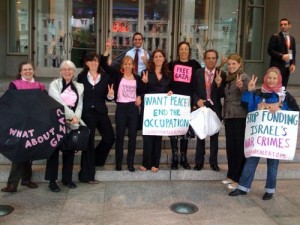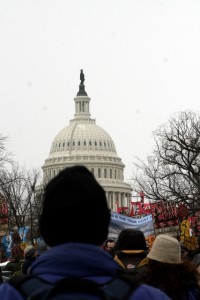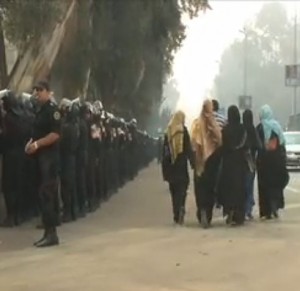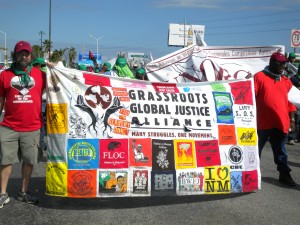The following post is cross-posted on Common Dreams.
By Medea Benjamin and Charles Davis
Given that President Obama daily authorizes the firing of hellfire missiles and the dropping of cluster bombs in places such as Afghanistan, Pakistan and Yemen, it was awful odd seeing him wax eloquent this week about the “moral force of non-violence” in places like Egypt and Tunisia. But there he was, the commander-in-chief of the largest empire in history, praising the power of peaceful protest in countries with repressive leaders backed by his own administration.
Were we unfamiliar with his actual policies – more than doubling the troops in Afghanistan, dramatically escalating a deadly drone war in Pakistan and unilaterally bombing for peace in Libya – it might have been inspiring to hear a major head of state reject violence as a means to political ends. Instead, we almost choked on the hypocrisy.
Cast beforehand as a major address on the Middle East, what President Obama offered with his speech on Thursday was nothing more than a reprisal of his 2009 address in Cairo: a lot of rhetoric about U.S. support for peace and freedom in the region contradicted by the actual – and bipartisan – U.S. policy over the past half-century of supporting ruthless authoritarian regimes. Yet even for all his talk of human rights and how he “will not tolerate aggression across borders” – yes, a U.S. president said this – Obama didn’t even feign concern about Saudi Arabia’s repressive regime invading neighboring Bahrain to put down a pro-democracy movement there. In fact, the words “Saudi Arabia” were never uttered.
It was that kind of speech: scathing condemnations of human rights abuses by the U.S.’s Official Enemies in places like Iran and Syria and muted criticism – if any – of the gross violations of human decency carried out by its dictatorial friends in Saudi Arabia, Bahrain and Yemen.
Obama predictably glossed over the reality of U.S. policy and, in an audacious attempt to rewrite history, portrayed his administration as being supportive of the fall of tyrannical governments across the Middle East and North Africa, ludicrously suggesting he had supported regime change in Hosni Mubarak’s Egypt – a claim betrayed by the $1.3 billion a year in military aid his administration provided to Mubarak’s regime right up until the moment he resigned. The president’s revisionism might fool a few cable news personalities – what wouldn’t – but it won’t fool Egyptians, less than one in five of whom even want the closer relationship with the U.S. that Obama offered in his speech, at least one that involves more military aid and neoliberal reforms imposed by the International Monetary Fund.
And Obama’s remarks shouldn’t fool their primary audience: American voters.
Contrary to the rhetoric of Obama’s speech, if the U.S. has sided with Middle Eastern publics against their brutal dictators it has not been because of their dictators’ brutality, which in the case of Mubarak was seen as a plus in the age of the war on terror. Nor has that support for the oppressed come in the form of – hold your laughter – non-violence. Rhetoric of change aside, how best to use the liberating power of bullets and bombs continues to be the guiding principle of U.S. policy in the Middle East.
And Obama certainly isn’t apologizing for that. In his speech called the war in Iraq, which conservatively speaking has killed hundreds of thousands of civilians, “costly and difficult” – and, grotesquely, “well intended” – but that was as much an acknowledgement as he was willing to make of the deadly failure of U.S. policy toward the region in recent decades. Indeed, Obama argued it was not a failure of policy but merely a failure of rhetoric, a “failure to speak to the broader aspirations of ordinary people” that had prompted the “suspicion” the U.S. pursues its own interests at the expense of those living in the countries it invades or whose dictators it supports.
But the truth of these suspicions was evident when Obama explained why the U.S.’s supposed national interests were at stake in the Middle East, claiming that “our own future is bound to this region by the forces of economics and security.” Notice which came first (and just so you know: both have to do with oil).
The president also didn’t deviate from his policy of “unshakable” support for Israeli militarism, typified by his administration’s efforts to safeguard the Jewish state from accountability for its war crimes in Gaza – crimes that left some 1,400 Palestinians dead – and his determination to hand an already wealthy nation more than $3 billion a year in military aid, even as it flaunts the “peace process” and colonizes ever more Palestinian land.
Though typical of his first two years in office, Obama’s duplicity was more evident – and his rhetoric more sloppy – than usual. Mere seconds after proclaiming that “every state has the right to self-defense,” Obama called for the creation of a “sovereign, non-militarized state” for Palestinians, meaning one incapable of defending itself. And while he spoke of Israeli parents fearing their children “could get blown up on a bus or by rockets fired at their homes,” he did not deign to mention the much for frequent and deadly Israeli violence perpetrated against Palestinians, saying only that the latter suffered “the humiliation of occupation,” as if Palestinian parents feel embarrassment, not pain, at the loss of child killed by an Israeli strike.
Obama’s remarks on the killing of Osama bin Laden were likewise delivered with a complete lack of self-awareness. Describing the latter as a “mass murderer,” Obama – who since taking office has the blood of hundreds of Afghan and Pakistani civilians on his hands – said bin Laden’s philosophy of using bloodshed to achieve desired political changes had been discredited “through the moral force of non-violence” that has swept the region. Peaceful protests, Obama proclaimed, had “achieved more change in six months than terrorists have accomplished in decades” – and more than decades of U.S. wars and occupations, he might have added.
Talking up the virtues of peaceful protest is great and all, but the pretty words lack their power coming from the commander-in-chief of the most lethal and widely deployed military force in world history. Mr. Obama, if you want talk about the evils of violence, great – but follow your own advice.
—–
Medea Benjamin (medea@globalexchange.org) is cofounder of Global Exchange (www.globalexchange.org) and CODEPINK: Women for Peace (www.codepinkalert.org).
Charles Davis (http://charliedavis.blogspot.com) is an independent journalist who has covered Congress for public radio and the international news wire Inter Press Service.







 Dalit Baum, Ph.D., is the founder of “Who Profits from the Occupation”, an activist research initiative of the
Dalit Baum, Ph.D., is the founder of “Who Profits from the Occupation”, an activist research initiative of the 


 the largest oil spill in American history, and oil from the spill continues to impact lives and livelihoods throughout the Gulf. Through this tragedy we have been reminded of the negative consequences of our dependence on dirty energy and our need to support clean alternatives for people and the planet. One year after the devastating Deepwater Horizon explosion, Global Exchange’s Energy Program Director, Antonia Juhasz,
the largest oil spill in American history, and oil from the spill continues to impact lives and livelihoods throughout the Gulf. Through this tragedy we have been reminded of the negative consequences of our dependence on dirty energy and our need to support clean alternatives for people and the planet. One year after the devastating Deepwater Horizon explosion, Global Exchange’s Energy Program Director, Antonia Juhasz, 
